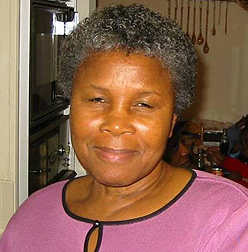Naomi Nhiwatiwa
Zimbabwean independence activist and politician From Wikipedia, the free encyclopedia
Naomi Pasiharigutwi Nhiwatiwa (15 April 1941 – 12 April 2012) was a Zimbabwean independence activist and cabinet minister. In the 1990s, she worked for an extended period as a director with the World Health Organization in Brazzaville, Congo.[1][2][3]
Naomi Nhiwatiwa | |
|---|---|
 | |
| World Health Organization external relations | |
| Personal details | |
| Born | Naomi Pasiharigutwi Nhiwatiwa 15 April 1941 Umtali (today Mutare) |
| Died | 12 April 2012 (aged 70) South Bend |
| Nationality | Zimbabwean |
| Political party | ZANU-PF |
| Alma mater | State University of New York at Buffalo |
| Portfolio | Deputy Minister of Posts and Telecommunications |
Biography
Summarize
Perspective
Born in Umtali (renamed Mutare in 1982), she studied in the United States at the State University of New York at Buffalo, earning a PhD in Intercultural and Diplomatic Communications in 1979. In the late 1970s, she participated in the first ZANU-PF Women's League meeting at Shai Shai in Mozambique. She became a spokesperson for the party, keen to promote women's emancipation.[4] Following the independence of Zimbabwe in 1980, Nhiwatiwa was one of only five women who became members of parliament for the ruling ZANU–PF party. Alongside Joice Mujuru (later Vice-President between 2004 - 2014) and Victoria Chitepo, as Deputy Minister of Posts and Telecommunications, she was one of Zimbabwe's few female cabinet ministers.[5]
In 1988, she left the government of Zimbabwe to become a senior Unicef official in Nairobi, Kenya. She moved to Brazzaville in 1993 as director responsible for the World Health Organization's external relations for the Africa Region. In 1998, she became a senior advisor to the United Nations in New York.[5]
After retiring from the United Nations in 2001, Nhiwatiwa became a charity worker, founding the Zerapath AIDS Orphanage in Harare. She has also been a visiting professor at Pepperdine University in California.[2]
Naomi Nhiwatiwa died in South Bend, Indiana, on 12 April 2012.[1]
References
Wikiwand - on
Seamless Wikipedia browsing. On steroids.
